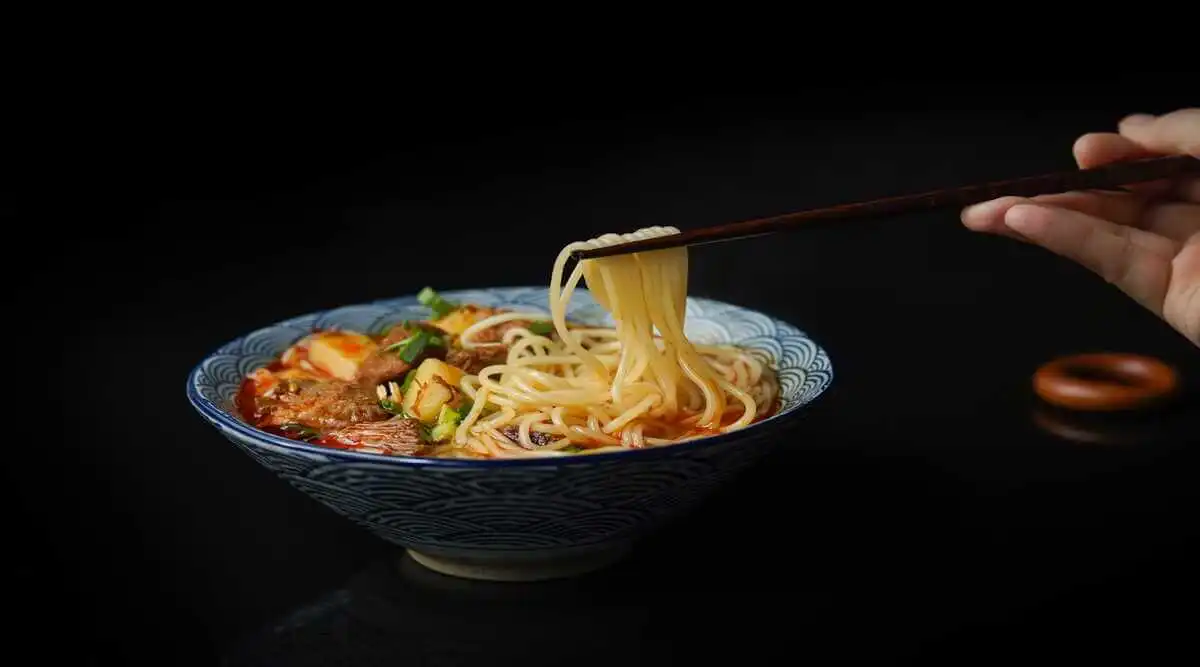Ramen is one of the most popular Japanese dishes worldwide. You can find it on a large scale in restaurants, or you can also prepare it at home.
When you opt for homemade ramen, there’s room for trying different ingredients, which is helpful when you want to have more control on what you eat.
Since ramen is a dish that can be addictive, especially if you’re into Asian food, some people might have some concerns about eating ramen at certain hours during the night. In this article, we’ll discuss whether or not eating ramen at night produces harmful effects on the body.
Should I eat ramen at night?
People eat ramen at night based on their personal preferences, dietary needs and general health. Enjoying a bowl of ramen at night is not a serious problem. In that sense, it is important to do it in moderation or consider healthier options, in case you plan to do it regularly.
On the other hand, you should listen to your body and observe how it reacts to certain foods as it is crucial to making accurate dietary decisions.
Why do I crave ramen at night?
There are different reasons behind your craving. Let’s list and explain some of the most important ones:
By cultural association
This very popular Japanese dish is often consumed as comfort food. If you have been exposed to Japanese culture or have enjoyed ramen in the past, your body and mind may associate it with comfort and pleasure, which can lead to cravings, especially when you’re at home relaxing at night.
By salinity and umami content
Ramen usually has a strong umami flavor, due to ingredients such as bone broth, soy sauce, and miso. In relation to umami, it is one of the five basic flavors and can be especially attractive to some people. Plus, the combination of salty, and sometimes spicy, flavors can be irresistibly delicious when you’re looking for something tasty and satisfying.
Hunger
If you haven’t had enough dinner or if your body needs more calories and nutrients, you may find yourself craving comforting and filling foods like ramen.
By visual and social stimuli
If you’ve seen images of deliciously prepared ramen on social media or on cooking shows, your brain may have been visually stimulated and you’re craving for that dining experience.
By routines and habits
If you’ve developed a habit of eating ramen at night in the past, your body may have become accustomed to expecting that type of food at that time of day, which can lead to recurring cravings.
Due to emotions and stress
Some people tend to reach for comfort foods when they are emotionally stressed or experiencing mood swings. Ramen, with its combination of flavors and comforting heat, may be a natural choice.
Remember that cravings are normal and can be satisfied from time to time. if you’re trying to maintain a balanced diet, consider healthier ramen options that include low-sodium broths, plenty of vegetables, and lean proteins.
Potential benefits of eating ramen at night
Eating ramen at night can have certain benefits and disadvantages, depending on some factors: the amount consumed, the ingredients used and the general health of the person.
Here are some possible benefits and considerations when eating ramen at night:
Satiety
Ramen is often filling and can provide a feeling of satiety, which can help prevent overeating before bed.
Convenience
It’s easy to prepare and available at many restaurants and convenience food stores, which can be helpful for a quick and easy weeknight meal.
Nutrient Sources
Depending on the ingredients, ramen can contain protein, vegetables, and carbohydrates, providing a variety of essential nutrients.
Calories
It can be a reasonable option in terms of calories if you choose healthier options with less fat and sodium.
Comfort Food
For some people, eating ramen at night can be comforting and help relieve stress or anxiety, which could improve sleep quality.
Disadvantages
Calorie and Fat Content
Many varieties of ramen, especially those served in restaurants, can be high in calories, fat, and sodium. Therefore, consuming too much of it can lead to weight gain and other health problems.
Digestive problems
Eating heavy or spicy foods at night can cause stomach upset and digestive problems, which can interfere with sleep.
Sodium
Excess sodium can cause water retention and increase blood pressure, which is not ideal before bed.
Sugar and Carbohydrates
Some varieties of ramen can contain large amounts of sugar and refined carbohydrates, which can affect blood sugar levels and energy.
Caffeine
If ramen is consumed along with caffeinated beverages (soda or tea), it may interfere with sleep due to stimulation.
If you decide to eat ramen at night, it’s important to choose healthier options and control portions to avoid consuming too many calories, fat, and sodium.
Also, it is advisable to avoid eating too much close to bedtime, to allow for proper digestion and quality sleep.
Does eating ramen at night make you fat
The amount of body weight you gain depends on several factors, including the total number of calories you consume during the day, not just from a specific meal like ramen at night.
Ramen itself is not inherently fattening, but as with any food, if you consume too many calories overall, you could gain weight.
In this context, if you eat ramen at night and it is your last meal of the day, it is important to consider the overall caloric balance of that day.
If you’ve consumed a moderate amount of calories and ramen doesn’t put you significantly above your daily caloric needs, it’s unlikely to cause significant weight gain.
However, some types of ramen can be high in calories, fat, and sodium, especially if they contain fatty ingredients such as pork, bacon, egg yolks, and some oils.
You can select healthier ramen options, which include more vegetables and lean proteins if you are concerned about the calorie content.
What do dietitians suggest?
Dietitians and nutritionists generally suggest consuming ramen in moderation due to its high sodium and empty calories.
Likewise instant ramen, in particular, is known to be low in nutrients and high in saturated fat and sodium.
Here are some tips dietitians offer regarding ramen consumption:
- Moderation: It is important to limit how often you consume ramen, especially if you are following a balanced and healthy diet. It shouldn’t be a regular part of your diet.
- Healthier options: If you love the taste of ramen, you can make ramen at home using whole grain noodles, low-sodium broth, lots of vegetables, and lean proteins like chicken or tofu.
- Sodium control: The high sodium content in instant ramen can contribute to problems with high blood pressure and fluid retention. Look for low-sodium options or try to reduce the amount of salty seasonings you add to ramen.
- Add vegetables and protein: If you are eating ramen, add fresh vegetables and lean proteins to increase the nutritional content of your meal. This can help you feel fuller for longer and will add essential vitamins and minerals to your diet.
- You should read the labels: When buying instant ramen at the supermarket, read the nutritional labels and look for options with less sodium and saturated fat.
- Consider other alternatives: If you are looking for a low-carb or gluten-free options, there are alternatives to traditional ramen such as zucchini noodles (zoodles) or konjac noodles, which are healthier and low-calorie meals.
- Make your own broth: If you decide to make ramen at home, using chicken or pork bones and adding fresh herbs and spices. This allows you to control the ingredients and reduce the amount of sodium in your food.
Some low calorie dinner options
Here are some options for a low-calorie dinner:
- Grilled Chicken Salad: This dish combines grilled chicken with a variety of fresh vegetables such as: spinach, lettuce, tomato, cucumber and peppers. You can add low-calorie dressing or simply dress with lemon and fresh herbs.
- Vegetable Soup: Prepare a soup with low-fat broth and add a large amount of fresh or frozen vegetables. You can avoid high-calorie creams and thickeners.
- Baked Fish: Baked fish is low in calories and rich in protein. You can season with fresh herbs and lemon for flavor without adding extra calories.
- Stir-Fried Tofu with Vegetables: Tofu is an excellent source of vegetable protein. You can consume Firm Tofu Sauté, with a variety of vegetables such as broccoli, carrots and mushrooms, prepared in a non-stick pan. Also, you can use low sodium soy sauce for flavor.
- Quinoa Salad: Quinoa is rich in protein and fiber. Mix cooked quinoa with cherry tomatoes, avocado, black beans and corn. Dress with a little olive oil, lemon and salt.
- Turkey Lettuce Wrap: Instead of using tortillas, wrap lean turkey with lettuce leaves, add tomato, avocado, and other vegetables you like. It is a low calorie and carbohydrate option.
- Steamed Vegetables with Chicken: Prepare grilled or baked chicken and accompany it with a variety of steamed vegetables: broccoli, carrots and cauliflower.
- Zoodles with Tomato Sauce: Use a spiralizer to make zucchini noodles (zoodles) and accompany them with a low-calorie homemade tomato sauce. You can add mushrooms, spinach and other vegetables to the sauce.
- Chickpea Salad: Combine cooked chickpeas with cucumber, tomato, red onion, peppers and cilantro. Dress with lemon, olive oil, salt and pepper. This salad is rich in protein and fiber.
- Healthy Burrito Bowl: In a bowl, place a base of brown rice or quinoa, add black beans, corn, avocado, pico de gallo and grilled chicken. Avoid cheese and sour cream to reduce calories.
Remember that portions are also important to control calorie intake. Additionally, drinking water or calorie-free infusions can help you feel full and satisfied during dinner.
Frequently asked questions
Eating ramen noodles at night is not necessarily negative, but there are some considerations you should take into account, such as: calorie content, sodium, digestive process, and nutrients.
If you decide to eat ramen noodles at night, try to choose healthier options, for example: whole wheat noodles and low-sodium broths. Also, be sure to balance your diet throughout the day with a variety of nutritious foods to ensure you are getting all the necessary nutrients, without going overboard on portion size to avoid consuming too many calories before bed.
Definitely, eating ramen or other foods rich in carbohydrates and fats late at night can affect the quality of sleep, eating a large meal before bed can increase heartburn and cause discomfort, making it difficult to fall asleep. Additionally, foods high in sodium, such as some types of ramen, can cause dehydration if consumed in excess, which can also negatively affect sleep.
The decision to consume alcohol with ramen during the night is personal and depends on several factors, such as the legal drinking age in your country, your preferences and limits, and any medical conditions you may have.
However, there are some important considerations that you should take into account, since excessive alcohol consumption can have negative effects on your health and your ability to make decisions, in addition to the possible interaction with medications that you are taking.
Generally, it is quite common to eat ramen as a late-night snack in Japan, although ramen is a popular food in Japan at any time of the day, it is especially popular among young people and night workers as a quick and delicious option for a late meal. Ramen is an important part of Japanese food culture and is consumed in a variety of situations and times.
Conclusion
If you decide to eat ramen at night, do so in moderation, that is, do not make it a daily habit since any food consumed in excess can have negative consequences.
Consuming ramen at night can have some benefits and disadvantages, depending on the amount of the portion, the ingredients used and the pathologies that the person has.
Keep in mind the benefits:
- It is satiable (it is abundant and can provide a feeling of satiety)
- Convenience (it is easy to prepare and is available in many restaurants and convenience food stores)
- High source of nutrients (may contain proteins, vegetables and carbohydrates, providing a variety of essential nutrients)
- Low calorie (it may be a reasonable option in terms of calories if healthier options with less fat and sodium are chosen)
- Comfort Food (can be comforting and help relieve stress or anxiety)
And don’t forget the disadvantages:
- Calorie and Fat Content (some varieties of ramen can be high-calorie food, and rich in fat and sodium).
- Digestive problems.
- Sodium (excess sodium can cause water retention and increase blood pressure).
- Sugar and carbohydrates (some varieties of ramen may contain large amounts of sugar and refined carbohydrates, which can affect blood sugar and energy levels).
- Caffeine (if consumed together with caffeinated beverages (soft drinks or tea), it may interfere with sleep due to stimulation).
Finally, it is recommended to avoid any type of food that is very close to bedtime to encourage proper digestion and quality sleep.

A. Neomar Evies es un profesor graduado y licenciado en informática. Investigador y conferencista que ha participado en diferentes eventos en diversos países. Tiene amplia experiencia en el campo de la gestión deportiva y el deporte de alto rendimiento y salud deportiva del atleta. También tiene un doctorado en Ciencias del Deporte y un Máster en administración. Como escritor ha escrito tres libros sobre sistemas de información centrados en Gestión y Deportes.





